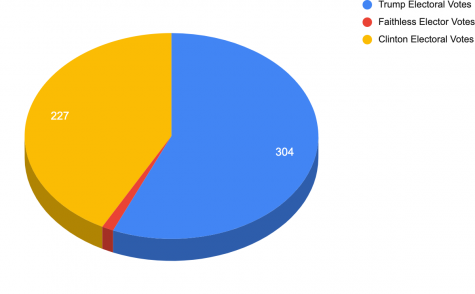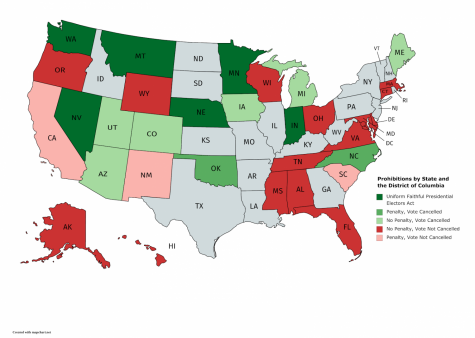This Election is About to Get More Complicated
| As if there wasn’t already enough confusion and controversy surrounding the 2020 Election, most people are unaware that the party electors who vote in the Electoral College can actually vote against their party’s candidate, potentially swinging the election one way or another. The topic of faithless electors is not widely understood among Americans, but it is crucial to understand how they can affect election outcomes.
It sounds odd but the votes cast on election day are not what decides the President of the United States. A month after election day, a group of “electors” (representing their state proportional to its number of congress members) cast their votes for the next president. A margin of one vote decided two United States presidential elections and could have decided three. Rutherford B. Hayes won the presidency by one electoral vote while Thomas Jefferson won by one vote in the House of Representatives following a tie in the Electoral College. Imagine what would happen if that one elector changed their mind before they vote on December 14th. In the history of the United States, only one presidential election was decided based on the influence of a faithless elector. In the election of 1836, Richard Mentor Johnson won the vice presidential race with President Martin Van Buren, but 23 electors in Virginia who pledged to vote for Johnson then voted for William Smith. It is entirely possible that this could happen again in a presidential election. Looking at this, the question “How can a state make sure an elector will vote for the candidate they pledged to vote for?”  Members of the electoral college (divided by party) are expected to follow the popular vote for their state or region of the state. But, it doesn’t always work out that way. Many electors have not only voted contrary to their constituents but sometimes even for obscure candidates that got very few votes. Considering all the confusion around this election, could some electors “amend the results” in a sense? For such a consequential part of our democracy, it’s surprising how little most of us understand the electoral college. Neither of the two teenagers we interviewed were familiar with the concept of a faithless elector (one who votes against their local popular vote) and most people are not. Both expressed a feeling that it defeated the purpose of our democratic process. “It feels like your vote didn’t matter” Sharon Yang went on to explain that most people are likely unaware of this possibility. Similarly, former student Nicole Selig asked the seemingly logical question: “Doesn’t it defeat the purpose of the electoral college?”. It is obvious that there is a lack of understanding among the general public about the topic of faithless electors – so what are they and why should we care? So what could go wrong? A highly polarized electorate and a close presidential race could be the recipe for many unexpected outcomes caused by faithless electors. The 2016 election of President Trump vs. Hillary Clinton saw a record high number of faithless electors. Seven electors in total cast their ballots for candidates other than the one that they were pledged to vote for. Among these seven, five were faithless to Hillary Clinton and two were faithless to President Trump. As shown in the 2016 election, a close and polarized race can lead to more faithless electors than usual, and it begs the question: could these faithless electors tip the scales in an election and cause a different outcome than is expected?  There are laws in 33 states plus the District of Columbia forbidding “faithless electing”. In other words, an elector decides to cast their vote contrary to that of the majority of their constituents. 16 of these states plus D.C. have no penalty designated for this act nor any mechanism to cancel the vote. 5 states punish electors for certain kinds of unusual votes and 14 states require either the vote to be canceled or the elector replaced. The Supreme Court ruled that these laws were constitutional in Chiafalo v. Washington this summer. “The Uniform Faithful Presidential Electors Act (U.F.P.E.A.) provides a statutory remedy in the event a state presidential elector fails to vote in accordance with the voters of his or her state. The act has a state-administered pledge of faithfulness, with any attempt by an elector to submit a vote in violation of that pledge, effectively constituting resignation from the office of elector. The act provides a mechanism for filling a vacancy created for that reason or any other.” Explains uniformlaws.org.  The only way a state can enforce an elector to vote for the candidate they pledged to vote for is to pass faithless elector laws. Mrs. Peling, a teacher at Hall High School said that “The only way they can punish faithless electors is to pass faithless elector state laws.” With these laws in place, electors will have no choice but to vote for their state’s popular vote. For example, in Oklahoma and North Carolina, faithless electors can be fined, and their vote is canceled. Laws like these will ensure fewer unexpected outcomes during presidential elections and make sure a state goes the way of the popular vote. |





